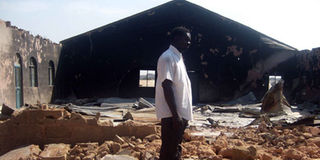Three killed in Nigeria church bombing

AFP PHOTO/AMINU ABUBAKAR
A file picture taken on January 24, 2010 shows a Christian resident of the Nassarawa Gwom district of the central Nigerian city of Jos standing near a church burnt in the four-day Christian-Muslim sectarian violence which left about 400 dead and 18,000 residents displaced in Jos. A suicide bomber blew himself up on March 11, 2012 when he drove his car towards a church in central Nigerian city of Jos, causing a heavy blast that injured three people, the emergency NEMA agency said.
LAGOS, Sunday
A suicide bomber blew himself up outside a Catholic church in the Nigerian city of Jos on Sunday, killing at least three people, the emergency services said.
The man drove his car towards St Finbar's Catholic church in the city before setting off a large explosion, killing himself and three churchgoers, emergency agency spokesman Yushau Shuaib told AFP.
"Three confirmed dead," said Shuaib, adding that several others were in a critical condition.
"The bomb exploded before he could get to the church," he said of the bomber.
Earlier Shuaib said three people had been injured in the attack and only the bomber had been killed.
Mark Lipdo, a resident of the Rayfield area of the city where the church is located, told AFP that security forces had cordoned off the area.
The attack was similar to a February 26 suicide bombing of another church in Jos, which killed three people, including a toddler.
Responsibility for that attack was claimed by Islamist extremist sect Boko Haram, which warned of more such assaults.
The worst recent attack on a Catholic church came on December 25 last, when 44 people were killed during a mass to celebrate Christmas in a town outside the capital Abuja.
Jos lies in the so-called middle belt region dividing the mainly Muslim north and predominantly Christian south, and hundreds of people have been killed in clashes between Muslim and Christian ethnic groups in recent years.
Violence blamed on Boko Haram, whose goals remain largely unclear, has since 2009 claimed more than 1,000 lives, including more than 300 this year, according to figures tallied by AFP and rights groups.




